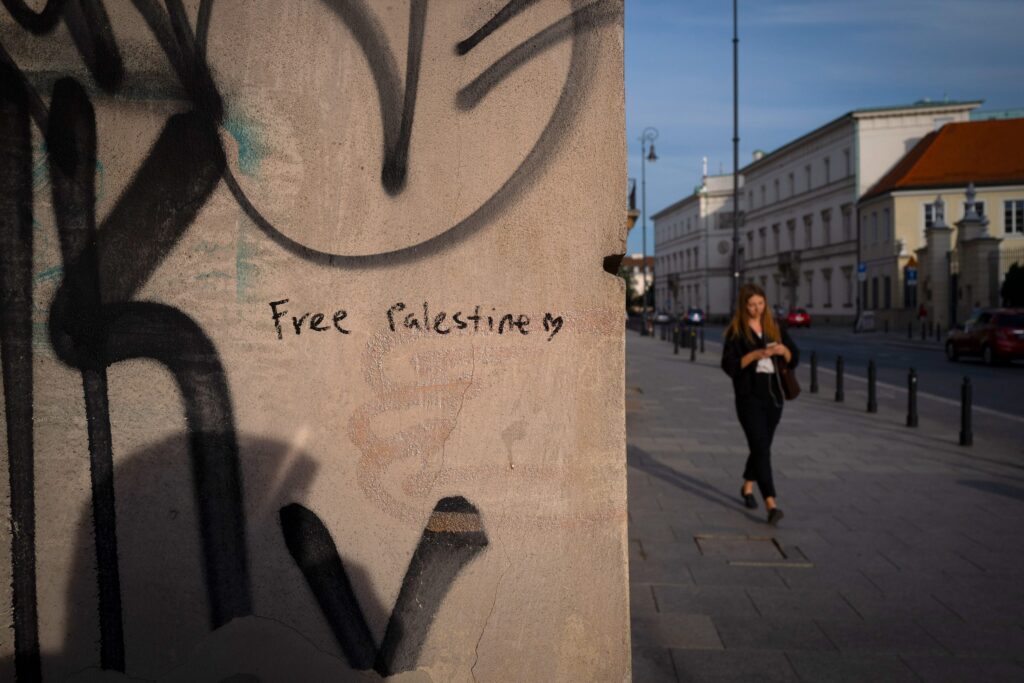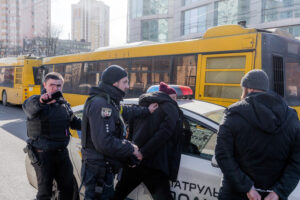Israel/Palestine Through Polish Eyes

History might be made by the victors at first, but it is best understood later through the vanquished, the German historian Reinhart Koselleck wrote. And so it is today with Poland and its understanding of the conflict between Israel and Palestine. Poland, a nation that itself long seemed vanquished, understands well both the Israelis’ fear for their security and the Palestinians’ desire for an independent state.
This is an awareness forged by the experience of acquiring sovereignty after historic trauma. Poles struggled to regain a fully sovereign state for two centuries: from the (third) partition of their nation in 1795 until the fall of communism in 1989 (except for the short experience of the Second Republic, in 1918-39). They know the costs of not having one—as in 1939, when simultaneous aggression by Nazi Germany and the Soviet Union not only divided the entire region but also brought about the murder and mass suffering of millions of civilians, including a large Jewish minority. Today, Poles intuitively recognize that the collective traumas of both Israelis and Palestinians mirror their own past suffering. And they understand that these two traumas fail to recognize each other.
Earlier this year, in an address to the Polish Parliament, Foreign Minister Radosław Sikorski underlined several times Israel’s right to self-defense and the importance of its safety. He also asked whether Israel “considers the possibility of coexistence with the Palestinian state—recognized by Poland—and, if not, what plans it has for the five million Palestinians whose lives it controls.”
This position is not entirely novel, nor such a marked departure under the new government of Prime Minister Donald Tusk, who returned to power last year, after defeating the nationalist right-wing Law and Justice party in parliamentary elections. Rather, it signals a gradual shift toward greater support for the Palestinians, with Polish characteristics. The Palestinians’ vanquished condition looms large in public opinion worldwide, and as elsewhere, left-wing students have been protesting on the campus of Warsaw University. But in Poland the mobilization also signifies something distinct.
After World War II, Poland was pushed into Moscow’s orbit. Its positions on Israel and Palestine in those years were not entirely its own. The US supported Israel; the USSR endorsed the neighboring Arab countries; decisions made in Warsaw tracked obvious Cold War divisions. After the Six Day War in 1967, communist Poland, like other Eastern-bloc countries, broke off diplomatic relations with Israel. In 1988, it welcomed the declaration of Palestinian independence at the Palestinian National Council meeting in Algiers.
Poland’s own democratic breakthrough after 1989 brought about a new independent politics. It could now choose among several paths, including the decisively pro-Israel position of the Czech Republic. It then generally stuck to the Americans’ line, yet on Palestine, it adopted a rather nuanced approach.
In 1990, Poland resumed diplomatic relations with Israel. Its first democratically elected president, Lech Wałęsa, visited Israel a year later. Tensions nonetheless continued to arise between the two countries—over interpretations of the history of anti-Semitism, over the involvement of Polish citizens in the Holocaust. But there also was no shortage of political gestures of friendship. Polin, one of the world’s most modern museums of Jewish history, opened in Warsaw in 2013.
One could say that for a significant while the new democratic Polish government’s approach was cautiously pro-Israel. In 2011, UNESCO member countries held a vote about whether to admit Palestine to join the organization: 107 countries voted for, 14 voted against, and 52, including Poland, abstained. The next year, Palestine won another vote in the UN General Assembly granting it observer status. Again, Poland abstained.
Then in 2015, the Law and Justice party returned to power in Poland and relations with Israel started to shift. In theory, nationalist populists have similar agendas, but in practice, they often walk different paths and clash. Regularly there were frictions between that Polish government and the Netanyahu cabinet, mostly over the politics of history and their respective attitudes of martyrdom.
Both administrations subscribed to a messianic interpretation of their nations’ pasts, sometimes straying far from both historical and diplomatic standards. To win elections at home, they competed with each other in trauma politics—over whose trauma was worse, who had the moral right to criticize, who could legitimately speak louder about the past.
In late 2017, President Donald Trump announced that the United States would now recognize Jerusalem as the capital of Israel and relocate its embassy there from Tel Aviv. Some 128 states in the UN General Assembly voted against that decision, nine voted for it and 35 states abstained. The populist Polish government, however close to Trump, was among the abstainers.
In early December 2017, the head of the Polish Foreign Ministry declared that he still believed “Tel Aviv is the capital of Israel.” A few days later, a spokesperson for the Polish Ministry of Foreign Affairs issued this statement: “Poland is in favor of a political solution to the Palestinian-Israeli conflict based on a two-state model, assuming that the aspirations of both parties to the conflict are realized. Reaching an agreement on this issue is possible only through peace talks.” But the desire to maintain good relations with Washington remained: A Middle East summit organized under US auspices was held in Warsaw in February 2019, and the Israeli prime minister attended.
Today, Poland’s nationalist populists are in the opposition. The Tusk administration is liberal-democratic and pro-European. On May 10, for the first time in its post-1989 history, Poland explicitly sided with the Palestinians. During a crucial vote on Palestine’s application for full membership at the UN, 143 countries voted in favor, 9 voted against, and 25 abstained. Poland voted for.
What happened? Here are a few tentative explanations:
- In April, Damian Soból, a Pole working for the food-relief non-profit organization World Central Kitchen, was killed in a humanitarian convoy in Gaza, and the Polish government could not ignore this fact. Journalists asked if the killing was a war crime; a local prosecutor’s office opened an investigation. In reaction to Mr. Soból’s death, Mr. Sikorski said: “Self-defense in a just cause does not exempt anyone from responsibility for their own actions and for violating the laws of war.” A country’s foreign policy is not built on the death of any one person. But the Tusk government was careful to react decisively to this death and present the face of a kind of dignity politics—as the previous government had done, to good effect with popular opinion.
- The liberal Polish government seems to want to keep some distance from the illiberal Israeli government. Diplomatic tensions with Israel no longer concern disputes over the politics of trauma. The Polish government today seems rather more sympathetic to the left-liberal opposition in Israel than the current government. After the UN vote on Palestine’s full membership in May, the Israeli ambassador to Poland, Yacov Levne, said on the X platform that the decision was “a dangerous precedent of rewarding the aggressor” and “harmful” for Poland. Mr. Sikorski called the statement patronizing and said that “the Polish government will decide what is good for Poland, not foreign ambassadors.”
- Understandings of collective trauma have evolved over the past decades. For years after 1989, Polish politicians perfectly understood Israel’s concerns about being wiped off the map. Geographical distance and political differences could not obscure the fact that Poland and Israel were united by the shared experience of post-traumatic sovereignty. The prospect of annihilation shaped political decision-making in both places. But the war in Gaza has shifted perspectives. The enduring trauma of Israeli Jews may still mean that they fear a repeat of the Holocaust. At the same time, Palestinian civilians are now experiencing the unique dual trauma of living not only under the terrorist rule of Hamas but also under Israeli fire. And celebrated Polish public intellectuals have been pointing out just how indiscriminate that fire is about, among other things, killing children.
Again: The Polish government has not stopped recognizing the trauma suffered by Jews. But by now the Israeli state has been established, and so even as Poles understand the legitimacy of Israel’s security concerns, they are increasingly empathetic to the Palestinians—the vanquished of today, helplessly trying to obtain a state of their own. To say this is not to condone or even accept the terrorism inflicted by Hamas; it is, rather, more like expressing sympathy for the Ukrainians struggling to liberate their state from occupation by another.
In his beautiful book “Memory, History, Forgetting,” the philosopher Paul Ricœur cautioned against placing exaggerated expectations on processes of reconciliation. Brotherhood, he wrote, might be too big a word, and seeking it, too great a burden. Better, in his opinion, to aim for normalcy. In support for this idea, he cited another philosopher, Klaus-Michael Kodalle, who, Ricoeur said, conceived of normalcy between neighboring enemies “as a sort of incognito forgiveness”—“not fraternization but proper behavior in relations of exchange.” The simple act of selling and buying a loaf of bread can be a great accomplishment.
Forgiveness between Israel and Palestine seems impossible today. Even normalcy does, too. Two traumatized peoples exist side by side, vast groups among them apparently incapable of mutual empathy. But once-vanquished nations like Poland know this problem well—and might be able to help them see a way to just trade bread again.


